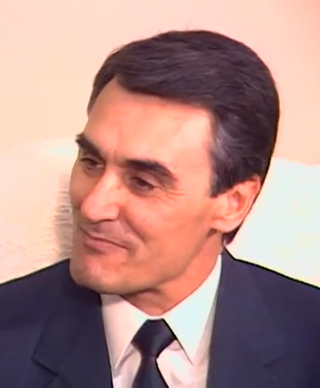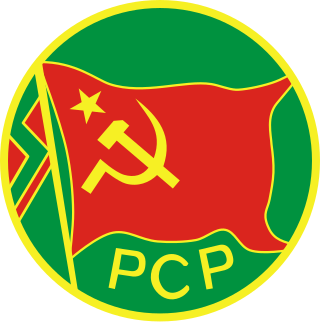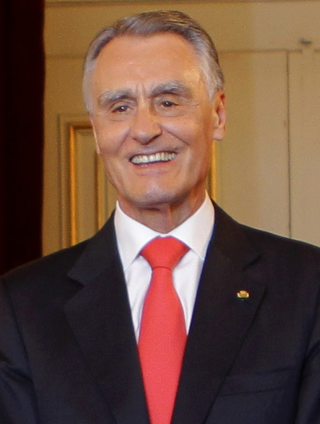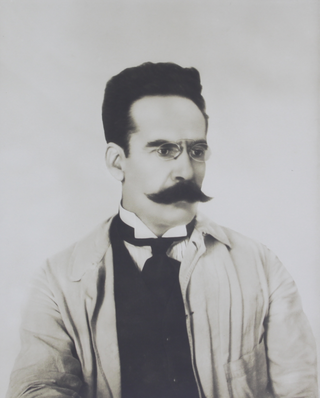
The Portuguese Communist Party is a communist and Marxist–Leninist political party in Portugal based upon democratic centralism. It is one of the strongest communist parties in Western Europe and the oldest Portuguese political party with uninterrupted existence. It is characterized as being between the left-wing and far-left on the political spectrum. Since 1987, it runs to any national, local and European elections in coalition with the Ecologist Party "The Greens" (PEV), assembled in the Unitary Democratic Coalition (CDU).

The Ecologist Party "The Greens" is a Portuguese eco-socialist political party. It is a member of the European Greens and a founding member of the European Federation of Green Parties.

Manuel Alegre de Melo Duarte, GCL is a Portuguese poet and politician, member of the Socialist Party, and a candidate for the 2006 Portuguese presidential election. He ran again in the 2011 presidential election, this time backed by the Left Bloc and the Socialist Party. Alegre was awarded the Camões Prize in 2017.

Presidential elections were held in Portugal on 7 December 1980.

The 1995 Portuguese legislative election took place on 1 October. The election renewed all 230 members of the Assembly of the Republic.

The 1987 Portuguese legislative election took place on 19 July. The election renewed all 250 members of the Assembly of the Republic.

Constituent Assembly elections were carried out in Portugal on 25 April 1975, exactly one year after the Carnation Revolution. The election elected all 250 members of the Portuguese Constituent Assembly.

The 1985 Portuguese legislative election took place on 6 October. The election renewed all 250 members of the Assembly of the Republic.

The history of the Portuguese Communist Party, spans a period of 102–103 years, since its foundation in 1921 as the Portuguese section of the Communist International (Comintern) to the present. The Party is still an active force within Portuguese society.
Portugal's redemocratization process started with the Carnation Revolution of 1974. It ended with the enactment of the Constitution of Portugal in 1976.

This is a table of the electoral results of the Portuguese Communist Party. Despite the Party had been founded in 1921, the party experienced little time as a legal party, being forced into clandestinity after a military coup in 1926. In the following decades, Portugal was dominated by the dictatorial regime led by António Oliveira Salazar, that kept the Party illegal. Although the regime allowed elections during some periods, the Party, given its illegal status, could never legally enter the electoral process and the heavy manipulation of the electoral results never allowed a democratic candidate to win. The regime would only end in 1974, with the Carnation Revolution, that implemented broad democratic changes in the country.

Aníbal António Cavaco Silva is a Portuguese economist and politician who served as the 19th president of Portugal, from 9 March 2006 to 9 March 2016, and as prime minister of Portugal, from 6 November 1985 to 25 October 1995. His 10-year tenure was the longest of any prime minister since Salazar, and the longest for a freely elected prime minister in Portugal's republican history. He was the first Portuguese prime minister to win an absolute parliamentary majority under the current constitutional system. He is best known for leading Portugal into the European Union.

Presidential elections were held in Portugal on 23 January 2011. The elections resulted in the re-election of Aníbal Cavaco Silva to a second term as President of Portugal. Turnout in this election was very low, where only 46.52 percent of the electorate cast their ballots. Cavaco Silva won by a landslide winning all 18 districts, both Autonomous regions of Azores and Madeira and 292 municipalities of a total of 308.

Manuel de Brito Camacho a Portuguese military officer, writer, publicist and politician, who among other positions, was Minister of Public Works, Commerce and Industry (1910–1911) and Republican High Commissioner to Portuguese Mozambique. He was the founder of the Partido Unionista, and director of the newspaper A Luta, the mouthpiece of the same Party.

The 2015 Portuguese legislative election was held on 4 October. All 230 seats of the Assembly of the Republic were in contention.

Presidential elections were held in Portugal on 24 January 2016. The election chose the successor to the President Aníbal Cavaco Silva, who was constitutionally not allowed to run for a third consecutive term.
António Borges Coutinho GOL was a Portuguese lawyer and politician.

Cândida Ventura was a political activist against the Portuguese Estado Novo regime and a political prisoner. She was the first woman to hold a leadership position in the Portuguese Communist Party (PCP).

Presidential elections are scheduled to be held in Portugal in January 2026. The election will elect the successor to President Marcelo Rebelo de Sousa, who is barred from running for a third term. Every Portuguese President since carnation revolution has been re-elected for second term but only one, Mário Soares (PS) ran for a non-consecutive third term in the 2006 Presidential Election and lost, making it that every Portuguese President since the carnation revolution of 1974 has been exactly two terms in office.















